1061 scholarly books by Catholic University of America Press and 44
start with E
1061 scholarly books by Catholic University of America Press and 44
1061 scholarly books by Catholic University of America Press
44 start with E start with E
44 start with E start with E

Early Christian Biographies
Pontius
Catholic University of America Press, 1952
Most of the saints' lives presented here, though the volume is entitled Early Christian Biographies, belong in reality to quite another category, hagiography.
[more]
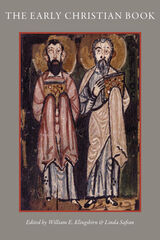
The Early Christian Book (CUA Studies in Early Christianity)
William E. Klingshirn
Catholic University of America Press, 2007
Written by experts in the field, the essays in this volume examine the early Christian book from a wide range of disciplines: religion, art history, history, Near Eastern studies, and classics.
[more]
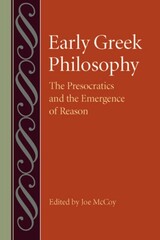
Early Greek Philosophy
Joe McCoy
Catholic University of America Press, 2013
The philosophy of the Presocratics still governs scholarly discussion today. This important volume grapples with a host of philosophical issues and philological and historical problems inherent in interpreting Presocratic philosophers.
[more]
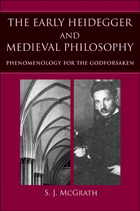
The Early Heidegger and Medieval Philosophy
Phenomenology for the Godforsaken
S. J. McGrath
Catholic University of America Press, 2006
The Early Heidegger and Medieval Philosophy is a major interpretive study of Heidegger's complex relationship to medieval philosophy.
[more]
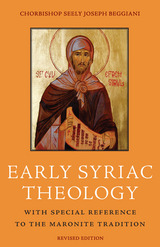
Early Syriac Theology
Chorbishop Seely Joseph Beggiani
Catholic University of America Press, 2014
Presents the insights of St. Ephrem and Jacob of Serugh, two of the earliest representatives of the theological world-view of the Syriac church.
[more]
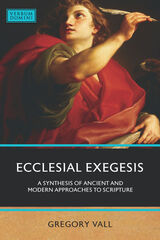
Ecclesial Exegesis
A Synthesis of Ancient and Modern Approaches to Scripture
Gregory Vall
Catholic University of America Press, 2022
There is broad support today for the idea that biblical scholarship ought to be informed by the faith of the Church and serve the life of the Church. In a word, it should be ecclesial. There is far less agreement, however, when one asks how this goal is to be achieved and what ecclesial exegesis ought to look like. In 1988, Joseph Ratzinger put forth his “Method C” proposal, calling for the development of a new exegetical and hermeneutical synthesis. This would be neither a retreat to the patristic-medieval approach (Method A) nor the continued hegemony of the historical-critical approach (Method B). The latter must be purified of its positivism through a transformational encounter with the former, so that the gifts of both might be released for the life of the Church. Such a synthesis, Ratzinger claimed, would require the philosophical, theological, exegetical, and hermeneutical work of “at least a whole generation” of scholars.
Gregory Vall has devoted over thirty years to the development of ecclesial exegesis, and the present volume represents the mature fruit of his labor. Over against those who treat Dei Verbum as Vatican II’s endorsement of the historical-critical method, he demonstrates that the dogmatic constitution actually points to something very much like Ratzinger’s Method C. Employing a dialogic movement between the inductive-exegetical and the deductive-dogmatic, Vall offers nine studies that bring to the surface issues such as the relationship between Old Testament and New Testament, literal sense and spiritual sense, and Scripture and Tradition. While Vall brings theological knowledge and hermeneutical skill to the quest for Method C, he also provides a great deal of valuable exegesis of both testaments. Ecclesial Exegesis is not simply another book of theory. It demonstrates how Method C can be done.
[more]
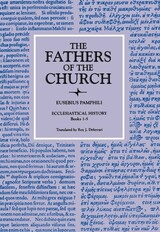
Ecclesiastical History, Books 1–5
Eusebius Pamphili
Catholic University of America Press, 1953
No description available
[more]
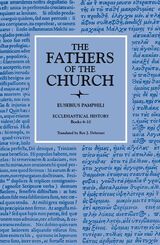
Ecclesiastical History, Books 6–10
Eusebius Pamphili
Catholic University of America Press, 1955
No description available
[more]
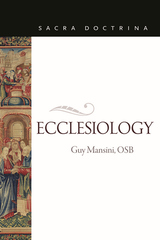
Ecclesiology
Guy Mansini, OSB
Catholic University of America Press, 2021
The first part of the book explains the antecedent probability both of revelation and of God’s institution of a church. It is ecclesiology in the mode of fundamental theology.
The second part rounds up what Scripture and Tradition teach about the Church under the heads of the People of God, the Temple of the Holy Spirit, the Bride of Christ, and the Body of Christ. The chapters present this thematic material under each head as a unified whole, across the Testaments, with each chapter keyed to one of the “marks” of the Church: the catholicity of the people of God, the apostolicity of the ministers of the messianic temple, the holiness of the Bride of Christ, and the unity of the Body of Christ. This already organizes things in a proto-systematic frame.
The third part of the book gives systematic exploration, in reverse order, to the unity of the Church, with attention to non-Catholic ecclesial communities and churches, to the holiness of the Church, objective and subjective, to the apostolicity of the Church and her mediation of revealed truth and grace, and to the catholicity of the Church, with attention to non-Christian religions.
The center of the book, on the definition of the Church as the sacrament of communion, renders recent French Dominican ecclesiology in a form more accessible to undergraduates and seminarians, rooting it in the New Testament teachings on communion and mysterion. The book concludes with a strenuous argument for the necessity of the Church and her mission of evangelization. Thus, the trajectory of the book is from the naturally knowable antecedent probability of the Church to its revealed necessity.
[more]
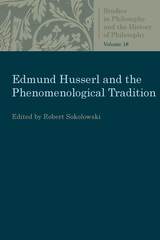
Edmund Husserl and the Phenomenological Tradition
Robert Sokolowski
Catholic University of America Press, 2018
A collection of papers meant to illustrate the richness of Edmund Husserl's own work and the tradition he began.
[more]
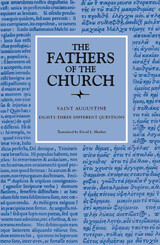
Eighty-three Different Questions
Saint Augustine
Catholic University of America Press, 1982
No description available
[more]

The Emergence of German Idealism
Michael Baur
Catholic University of America Press, 2018
Immanuel Kant's "critical philosophy" is rightly renowned for its criticism of the metaphysical pretensions of reason unaided by experience. It therefore seems ironic that, within a single generation, some of Kant's most important followers argued that th
[more]
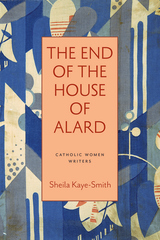
The End of the House of Alard
Sheila Kaye-Smith
Catholic University of America Press, 2022
The Catholic University of America Press is pleased to present the second volume in our Catholic Women Writers series, which will attempt to bring new attention to prose work of Catholic women writers from the 19th and 20th centuries. Sheila Kaye-Smith was a best selling author who had published over 50 books in her lifetime, few of which remain in print since her death in 1956.
The End of the House of Alard (1922) documents the choices made by the final generation of the aristocratic Alard family and the ways in which they, both willingly and reluctantly, bring the long line of their ancestral blood to a complete and sudden end. For some of them, the end of the Alard line is as painful to enact as it is for others to witness; for others it is welcomed as a necessary modernization or a true realignment toward religious integity and universal human truth. Some of the family's children yearn for individual liberty; others have it forced upon them. But none of them can find it under the burden of the Alard name and its crumbling estate. The End of the House of Alard is a novel about the human need for purpose, for a truth by which to live and for which to die. It is a novel about faith and idolatry, love and death, freedom and bondage, nature and grace. Put another way, it is about how human beings cannot escape the great challenge of salvation, of breaking free from false, man made gods in order to unite instead with the divine love of Christ. The novel's characters span a breadth of options on this spectrum and their various outlooks on life continue to reflect those available to us today.
[more]
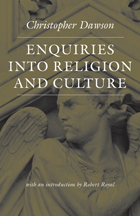
Enquiries into Religion and Culture (The Works of Christopher Dawson)
Christopher Dawson
Catholic University of America Press, 2009
The essays presented in this volume are among the most wide-ranging, intellectually rich, and diverse of Christopher Dawson's reflections on the relations of faith and culture
[more]
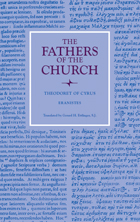
Eranistes
Gerard H. Theodoret of Cyrus
Catholic University of America Press, 2003
No description available
[more]
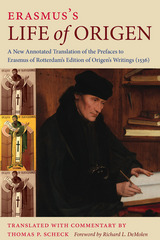
Erasmus's Life of Origen
Thomas P. Scheck
Catholic University of America Press, 2016
Erasmus of Rotterdam (1466-1536) hailed Origen of Alexandria (185-254) as a holy priest, a gifted homilist, a heroic Christian, and a celebrated exegete and theologian of the ancient Church. In this book Thomas Scheck presents one of the fruits of Erasmus's endeavors in the field of patristic studies (a particularly neglected field of scholarship within Erasmus studies) by providing the first English translation, annotated and thoroughly introduced, of Erasmus' final work, the Prefaces to his Edition of Origen's writings (1536). Originally published posthumously two months after Erasmus's death, the work surveys Origen of Alexandria's life, writings, preaching, and contribution to the Catholic Church. The staggering depth and breadth of Erasmus's learning are exhibited here, as well as the maturity of his theological reflections, which in many ways anticipate the irenicism of the Second Vatican Council with respect to Origen. Erasmus presents Origen as a marvelous doctor of the ancient Church who made a tremendous contribution to the Catholic exegetical tradition and who lived a saintly life.
[more]
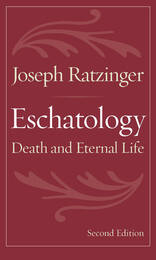
Eschatology
Death and the Eternal Life (Second Edition)
Joseph Ratzinger
Catholic University of America Press, 2007
Originally published in English in 1988, Joseph Ratzinger's Eschatology remains internationally recognized as a leading text on the "last things"—heaven and hell, purgatory and judgment, death and the immortality of the soul. This highly anticipated second edition includes a new preface by Joseph Ratzinger/Pope Benedict XVI and a supplement to the bibliography by theologian Peter A. Casarella.
Eschatology presents a balanced perspective of the doctrine at the center of Christian belief—the Church's faith in eternal life. Recognizing the task of contemporary eschatology as "to marry perspectives, so that person and community, present and future, are seen in their unity," Joseph Ratzinger brings together recent emphasis on the theology of hope for the future with the more traditional elements of the doctrine. His book has proven to be as timeless as it is timely.
[more]
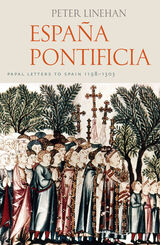
Espana Pontifica
Papal Letters to Spain 1198-1303
Peter Linehan
Catholic University of America Press, 2022
Peter Linehan (+2020) followed his survey of original papal letters in Portugal, Portugalia pontifica 1198-1417 (2013) with the present volume, España Pontifica, that covers papal letters to Spanish recipients from Pope Innocent II (1198-1216) to Pope Boniface VIII (+1303). This volume will provide students of the medieval papacy and the Spanish church with an invaluable research tool to explore the relationship between Rome and Spain during the crucial period of the Spanish Reconquistà after the battles of Navas de Tolosa (1212) to the capture of Seville (1248).
Linehan spent his career cataloguing papal letters from more than sixty Spanish repositories. For the past sixty years the Vatican has also been engaged in publishing surveys of original papal letters preserved from various European archives. However, this volume includes material that has not been included in these surveys.
[more]
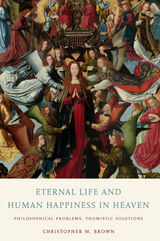
Eternal Life and Human Happiness in Heaven
Philosophical Problems, Thomistic Solutions
Christopher M. Brown
Catholic University of America Press, 2021
Eternal Life and Human Happiness in Heaven treats four apparent problems concerning eternal life in order to clarify our thinking about perfect human happiness in heaven. The teachings of St. Thomas Aquinas provide the basis for solutions to these four problems about eternal life insofar as his teachings call into question common contemporary theological or philosophical presuppositions about God, human persons, and the nature of heaven itself. Indeed, these Thomistic solutions often require us to think very differently from our contemporaries. But thinking differently with St. Thomas is worth it: for the Thomistic solutions to these apparent problems are more satisfying, on both theological and philosophical grounds, than a number of contemporary theological and philosophical approaches.
Christopher Brown deploys his argument in four sections. The first section lays out, in three chapters, four apparent problems concerning eternal life—Is heaven a mystical or social reality? Is heaven other-worldly or this-worldly? Is heaven static or dynamic? Won’t human persons eventually get bored in heaven? Brown then explains how and why some important contemporary Christian theologians and philosophers resolve these problems, and notes serious problems with each of these contemporary solutions. The second section explains, in five chapters, St. Thomas’ significant distinction between the essential reward of the saints in heaven and the accidental reward, and treats in detail his account of that in which the essential reward consists, namely, the beatific vision and the proper accidents of the vision (delight, joy, and charity). The third section treats, in five chapters, St. Thomas’ views on the multifaceted accidental reward in heaven, where the accidental reward includes, among other things, glorified human embodiment, participation in the communion of the saints, and the joy experienced by the saints in sensing God’s “new heavens and new earth.” Finally, section four argues, in four chapters, that St. Thomas’ views allow for powerful solutions to the four apparent problems about eternal life examined in the first section. These solutions are powerful because, not only are they consistent with authoritative, Catholic Christian Tradition, but they do not raise any of the significant theological or philosophical problems that attend the contemporary theological and philosophical solutions examined in the first section.
[more]
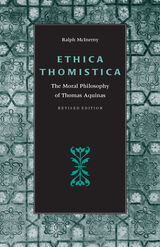
Ethica Thomistica
The Moral Philosophy of Thomas Aquinas
Ralph McInerny
Catholic University of America Press, 1997
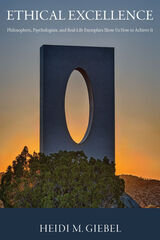
Ethical Excellence
Philosophers, Psychologists, and Real-Life Exemplars Show Us How to Achieve It
Heidi M. Giebel
Catholic University of America Press, 2021
Why do some people achieve ethical excellence while others fail? For example, how did Gloria Lewis overcome a lifetime of difficulty and go on to found a non-profit focused on feeding the homeless while Danny Starrett, despite a seemingly ideal childhood, became a rapist and murderer? Why did some Germans rescue their Jewish neighbors while others stood by?
One recent study found that four personal variables, taken together, differentiated Nazi-era bystanders from rescuers with startling 96.1% accuracy: social responsibility, altruistic moral reasoning, empathic concern, and risk-taking—traits related to ethical excellences (virtues) like justice, benevolence, and courage. Drawing from the combined wisdom of classical Socratic and Confucian philosophy, recent work in psychology, and the lived experience of recognized moral heroes, the book focuses on how each of us can work toward ethical excellence, becoming more like Lewis and neighbor-rescuers than like Starrett and Nazi-era bystanders.
The ancient Socratic and Confucian philosophical traditions offer surprisingly sophisticated advice regarding moral education. Because research in psychology helps us assess the feasibility of cultivating virtue in ourselves and those we influence, Ethical Excellence focuses on combining sound philosophical analysis of ethical virtue and related concepts with relevant empirical research on how these concepts are manifested and developed in everyday practice. Willpower, for example, contributes to development of temperance or moderation, grit relates to perseverance, and empathy is connected to benevolence.
Finally, the study of ethically exceptional people—moral heroes or exemplars—serves as living proof that ethical excellence is possible, and exemplars can provide inspiration to attempt it ourselves and guidance regarding how to do so successfully. Relevant stories and excerpts from the author’s own interviews with award-winning ethical exemplars complement the use of philosophical virtue theory and psychological research on virtue-relevant practice. Together, these three approaches—philosophy, psychology, and biography—help to triangulate” ethical excellence and its achievement, presenting a much clearer and more complete picture than we can get from any one of these methods alone.
[more]

Ethics and Theological Disclosures
The Thought of Robert Sokolowski
Guy Mansini, O.S.B.
Catholic University of America Press, 2003
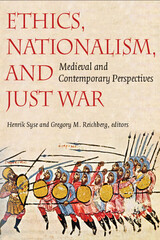
Ethics, Nationalism, and Just War
Medieval and Contemporary Perspectives
Henrik Syse
Catholic University of America Press, 2007
The book covers a wide range of topics and raises issues rarely touched on in the ethics-of-war literature, such as environmental concerns and the responsibility of bystanders.
[more]
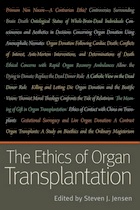
The Ethics of Organ Transplantation
Steven J. Jensen
Catholic University of America Press, 2011
These questions and others are thoughtfully probed in this collection of essays, which features articles from theologians, philosophers, physicians, biomedical ethicists, and an attorney.
[more]
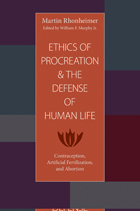
Ethics of Procreation and the Defense of Human Life
Contraception, Artficial Fertilization, and Abortion
Martin Rhonheimer
Catholic University of America Press, 2010
Building on the renewal of Thomistic ethics encouraged by key moral encyclicals including Humanae Vitae, Veritatis Splendor, and Evangelium Vitae, Swiss philosopher Martin Rhonheimer revisits some of the most difficult questions regarding the ethics of procreation and human life.
[more]
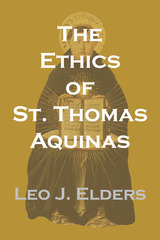
The Ethics of St. Thomas Aquinas
Happiness, Natural Law, and the Virtues
Leo Elders
Catholic University of America Press, 2019
"Elders brings to his study an almost encyclopedic knowledge of the history of philosophy. Although he advises his readers not to look for any novel interpretations of Thomas, the book is full of surprises. Time and again, he offers a concise history of the moral issue under consideration...A more authoritative introduction to the moral philosophy of Aquinas is not likely to be found. In fact, it is a delight to read." - Philosophy in Review
[more]
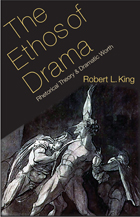
The Ethos of Drama
Rhetorical Theory and Dramatic Worth
Robert L. King
Catholic University of America Press, 2010
For the first time in the history of drama criticism this book uses traditional rhetorical theory to evaluate moral values in plays from Shakespeare's time to the present
[more]
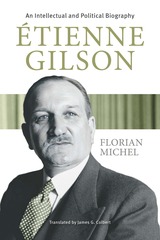
Etienne Gilson
An Intellectual and Political Biography
Florian Michel
Catholic University of America Press, 2023
Étienne Gilson (1884-1978) was a French philosopher and historian of philosophy, as well as a scholar of medieval philosophy. In 1946 he attained the distinction of being elected an "Immortal" (member) of the Académie française. He was nominated for the Nobel Prize in Literature in 1959 and 1964.
This major biography of Gilson was first published in France in 2018, and now arrives in a long-anticipated English translation. Florian Michel traces Gilson’s life through his time as a professor at the College de France and member of the French Academy. Gilson was a prisoner of war in Germany, was one of the first to describe the horrors of the famine in Ukraine (1922), created an institute of medieval studies in Toronto, published hundreds of articles in the French daily press and took part in the founding conferences of the United Nations.He was neither for Sartre nor for Aron, and advocated, when the NATO agreements were signed, the neutrality and non-alignment of Europe. Gilson did not hesitate to engage in quarrels with the bishops and allows us to understand how one passes from a critical modernism before the First World War to a liberal Thomism and to the Vatican Council II.
James G. Colbert, who translated Gilson’s The Metamorphosis of the City of God, offers a careful and measured translation to bring this important work to an English speaking audience.
[more]
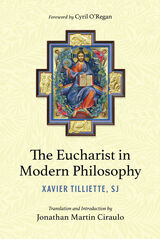
The Eucharist in Modern Philosophy
Xavier Tilliette
Catholic University of America Press, 2022
The Eucharist in Modern Philosophy is one of the last books written by the renowned Jesuit philosopher Xavier Tilliette (1921-2018), and the first to be translated into English. Jonathan Martin Ciraulo, the translator, also provides an introduction to the thought of Tilliette and the content of this book, while Cyril O’Regan provides the foreword, noting the particular intellectual characteristics of Tilliette and his analysis of eucharistic philosophies.
In addition to being known as one of the foremost experts on the German Idealist Friedrich Schelling, Tilliette wrote voluminously on the relationship between modern philosophy and theology, particularly concerning the way in which Christology is central to the development of modern philosophy. In this volume, he extends that project to look at how various philosophers, such as Descartes, Leibniz, Hegel, Blondel, and Marion, as well as poets and mystics, such as de Chardin, Simone Weil, and Paul Claudel, thought extensively about the question of the Eucharist. The result is an enormous diversity of Eucharistic thought, from Descartes’ attempt to justify transubstantiation in light of his philosophical revolution, to Feuerbach’s supposed exposure of the contradiction inherent to sacramentality, to Antonio Rosmini’s eucharistic piety and speculation, to Maurice Blondel’s recovery and expansion of Leibniz’s notion of the substantial bond. Tilliette shows that this philosophical conversation about the Eucharist is a living tradition, as the aporias and failures of one generation provide stimulus for all that follows. Much of the work is largely historical, showing in great detail the context of each particular eucharistic philosophy, but Tilliette also evaluates the relative fruitfulness of the various eucharistic theories for philosophy, theology, and the life of the Church. This book demonstrates that the Eucharist has been, and will likely continue to be, a major impetus for philosophical reflection.
[more]

Eucharistic Presence
A Study in the Theology of Disclosure
Robert Sokolowski
Catholic University of America Press, 1994
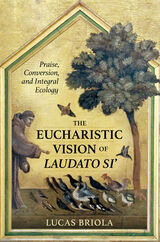
The Eucharistic Vision of Laudato Si
Praise, Conversion, and Integral Ecology
Lucas Briola
Catholic University of America Press, 2022
No other encyclical has generated as much conversation—both Catholic and non-Catholic—as Laudato si’. Often forgotten in these conversations is the theological heart and eucharistic vision of the encyclical and its integral ecology. Even the title of Laudato si’—“Praised be!”—signals the centrality of right praise in caring for our common home. Using Bernard Lonergan’s theology of history, this book unearths the doxological, eucharistic vision that shapes the encyclical’s integral presentation of social and ecological conversion. It offers the first book-length study that recovers the eucharistic nature of Laudato si’.
In drawing out the eucharistic vision of Laudato si’, the book accomplishes several feats for the reader. It roots the eucharistic dimensions of the encyclical in the writings of Popes John Paul II and Benedict XVI, showing how Pope Francis develops their thought in notable ways. It introduces Bernard Lonergan’s theology of history, showing how his framework can capture the eucharistic contours of caring for our common home; so too, in light of Laudato si’, does the book expand his theology of history to incorporate both ecological concern and the doxological, eucharistic essence of the church. The book assembles a liturgically shaped, systematic account of the church’s social mission. It joins poles otherwise sundered in a polarized church and world: between worship and justice, between concerns for human life and concerns for the natural world. Realizing the eucharistic vision of Laudato si’ promises much for our contemporary moment.
Pope Francis recently observed that the integral ecology of Laudato si’ holds the key for the world’s recovery from the COVID-19 pandemic. The U.S. Catholic Bishops recently launched a Eucharistic Revival that aims to rekindle eucharistic devotion and praxis. The Eucharistic Vision of Laudato Si’: Praise, Conversion, and Integral Ecology supplies a timely study that helps fulfill these intertwined calls.
[more]
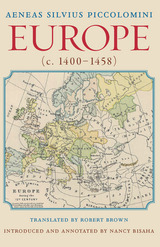
Europe (c.1400-1458)
Aeneas Silvius Piccolomini
Catholic University of America Press, 2013
This popular text circulated widely in manuscript form and was printed in several editions between the late 15th and the early 18th centuries, in Latin, German, and Italian. The present volume represents the first time this work has been translated into English, bringing its colorful narrative to the attention of a wider audience. This edition also provides extensive footnotes, an appendix of rulers, and a lengthy introduction to Aeneas?s life and the context and relevance of this work.
[more]
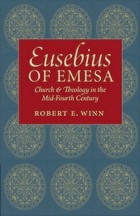
Eusebius of Emesa
Church and Theology in the Mid-Fourth Century
Robert E. Winn
Catholic University of America Press, 2011
Through a careful examination of his extant sermons, some of which survive in Latin and others in classical Armenian, this book invites readers to hear a bishop's voice from the mid- fourth century, an important period in late antique Christianity
[more]
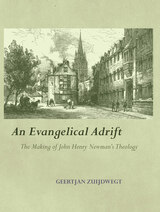
An Evangelical Adrift
The Making of John Henry Newman's Theology
Geertjan Zuijdwegt
Catholic University of America Press, 2022
An Evangelical Adrift is a theological biography of John Henry Newman (1801-1890) that reconstructs the most formative period in his development: the years between his teenage conversion to evangelicalism in 1816 and the beginning of the Tractarian Movement in 1833. By the early 1830s, Newman had explicitly rejected much of the theology he espoused in the late 1810s and early 1820s, and developed a highly original, deeply personal, and quite radical alternative, whose fundamental notions continued to shape his thought in later life. To date, there is neither a historically accurate nor a theologically sophisticated account of this change: the period in which it occurred is neglected, its significance is overlooked, its nature and content are misrepresented, and its scope is narrowed.
Besides being modelled on Newman’s own brief treatment of the period in his autobiographical Apologia pro vita sua (1864), later scholarly accounts are burdened by a persistent assumption that Newman’s catholic sensibility and anti-liberal convictions were constants throughout his life. This assumption was problematized by Frank Turner’s revisionist biography of the Anglican Newman (2002) and the ensuing debate about its reception. Zuijdwegt argues that Turner rightly identified evangelicalism as a key polemical target of the Anglican Newman, but stretched his argument too far by reducing Newman’s self-proclaimed lifelong battle against liberalism as a much later gloss on this earlier history.
The present study offers a compelling alternative to both mainline and revisionist interpretations. Based on detailed historical and theological analysis of the whole range of primary sources (including much neglected published and unpublished material), it meticulously reconstructs Newman’s youthful adoption of, gradual departure from, and theological alternative to evangelicalism. Against most mainline studies, it argues that this was a fundamental transformation, affecting nearly every aspect of Newman’s theology. Against Turner and other revisionists, it argues that this change was the product of careful and consistent theological reasoning and reflection, and that anti-liberalism was just as integral to it as anti-evangelicalism.
[more]
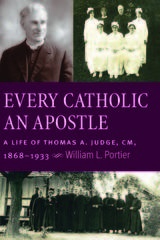
Every Catholic An Apostle
A Life of Thomas A. Judge, CM, 1868-1933
William L. Portier
Catholic University of America Press, 2017
Born in Boston of immigrant parents, Thomas A. Judge, CM (1868-1933) preached up and down the east coast on the Vincentian mission band between 1903 and 1915. Disturbed by the “leakage” of the immigrant poor from the church, he enlisted and organized lay women he met on the missions to work for the “preservation of the faith,” his watchword. His work grew apace with, and in some ways anticipated, the growing body of papal teaching on the lay apostolate. When he became superior of the godforsaken Vincentian Alabama mission in 1915, he invited the lay apostles to come south to help. “This is the layman’s hour,” he wrote in 1919. By then, however, many of his lay apostles had evolved in the direction of vowed communal life. This pioneer of the lay apostle founded two religious communities, one of women and one of men. With the indispensable help of his co-founder, Mother Boniface Keasey, he spent the last decade of his life trying to gain canonical approval for these groups, organizing them, and helping them learn “to train the work-a-day man and woman into an apostle, to cause each to be alert to the interests of the Church, to be the Church.” The roaring twenties saw the work expanded beyond the Alabama missions as far as Puerto Rico, which Judge viewed as a gateway to Latin America. The Great Depression ended this expansive mood and time and put agonizing pressure on Judge, his disciples, and their work. In 1932, the year before Judge’s death, the apostolic delegate, upon being appraised of Judge’s financial straits, described his work as “the only organized movement of its kind in the Church today that so completely meets the wishes of the Holy Father with reference to the Lay Apostolate.”
[more]
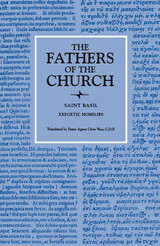
Exegetic Homilies
Saint Basil
Catholic University of America Press, 1963
No description available
[more]
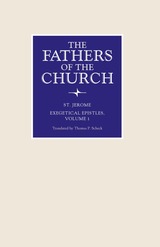
Exegetical Epistles
Thomas P. Jerome
Catholic University of America Press, 2023
The Nicene and Post-Nicene Fathers series of the 19th century rendered into English many of Jerome’s treatises and letters while bypassing his biblical commentaries as well as some of his most important exegetical letters. This omission, which was not helpful to scholarship, was probably due to the great length of these works. Although the problem was partly remedied by some new English translations of the 20th century, the present volume fills a significant lacuna by translating into English the Scriptural exegesis that Jerome conveyed in his relatively unknown epistles, many of which were composed in response to queries he had received from various correspondents. Many of these letters are presented here for the first time in English.
Based on the Hilberg edition, this volume contains new translations, introduced and annotated, of Jerome’s Epistles 18-21, 25-30, 34-37, 42, 53, 55-56, 59, 64-65, 72-74, 78, 85, 106, 112, 119-121, 129, 130, and 140. Two newly translated letters from the famous exchange with Augustine over the meaning of Galatians 2:11-14 are included (Epp. 56 and 112), as well as a new rendering of Ep. 130 to Demetrias (which technically is not an “exegetical” letter but does present important information about the Pelagian controversy). Overall, this collection hopes to serve as a useful introduction to Jerome’s approach to biblical interpretation, of both the Old and the New Testament. Some letters focus on the historical meaning of Pauline and Gospel texts, while others contain allegorical expositions of Old Testament passages. Jerome’s competence as a Hebrew scholar will become evident to the reader of this volume as well as his thorough acquaintance with the antecedent Greek and Latin Christian exegetical traditions.
[more]

Exegetical Epistles, Volume 2
Thomas P. St. Jerome
Catholic University of America Press, 2024
This is the second of a two-volume set that includes Thomas Scheck’s new translations of several of St. Jerome’s previously untranslated exegetical letters. Epistle 85 to St. Paulinus of Nola contains Jerome’s answers to two questions: how Exodus 7.13 and Romans 9.16 can be reconciled with free will, and what 1 Corinthians 7.14 means. Epistle 106 to Sunnias and Fretela, which deals with textual criticism of the Septuagint, consists of a meticulous defense of Jerome’s new translation of the Latin Psalter. Epistle 112 is a response to three letters from St. Augustine: Ep. 56 (contained in the previous volume), Ep. 67, and Ep 104. In the face of Augustine’s criticisms, Jerome defends his own endeavor to translate the Old Testament directly from the
Hebrew text. He also vindicates his own ecclesiastical interpretation of Galatians 2.4-11, as he had set this forth in his Commentary on Galatians, and along the way he accuses Augustine of advocating the heresy of Judaizing. Epistle 119 to Minervius and Alexander contains Jerome’s answers to some eschatological questions regarding the interpretation of 1 Corinthians 15.51 and 1 Thessalonians 4.17. In Epistle 120 to Hedibia, Jerome tackles twelve exegetical questions that focus on reconciling the discrepant Resurrection accounts in the Gospels, as well as questions about Romans 9.14-29, 2 Corinthians 2.16, and 1 Thessalonians 5.23. In Epistle 121 to Algasia, Jerome clarifies eleven exegetical questions dealing with passages in the Gospels and Paul’s letters (Romans 5.7; 7.7-25; 9.3-5; Colossians 2.18-19; 2 Thessalonians 2.3). This letter also contains an exposition of the parable of the unjust steward (Luke 16.1-10), in which Jerome translates material from a commentary attributed to Theophilus of Antioch. In Epistle 129 to
Dardanus, Jerome interprets “the promised land” and discusses the alleged crimes of the Jews. Epistle 130 to Demetrias is not an exegetical letter but an exhortation to the newly consecrated virgin on how to live out her vocation. In this letter Jerome reflects on Origenism and Pelagianism. Finally, in Epistle 140 to Cyprian the presbyter, Jerome expounds Psalm 90.
[more]
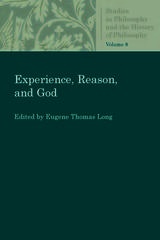
Experience, Reason, and God
Eugene Thomas Long
Catholic University of America Press, 2018
This volume examines the two basic approaches to the philosophy of religion in the history of western thought. One places primary emphasis on reason and the other places that emphasis on experience.
[more]
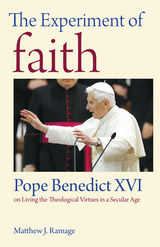
The Experiment of Faith
Pope Benedict XVI on Living the Theological Virtues in a Secular Age
Ramage
Catholic University of America Press, 2020
Pope Benedict XVI memorably remarked that the Christian faith is a lot like a Gothic cathedral with its stained-glass windows. From the outside, the Church can appear dark, dreary, and worn with age—the crumbling relic of an institution that no longer speaks to men and women living in our modern world. Indeed, for many people today, Christian morality with all of its commandments appears to be a source not of life and joy but instead of suffering and oppression. Even within the Church, many wonder: why should I submit to ancient doctrines and outdated practices that restrict my freedom and impede my happiness?
In this timely and original book, his third exploring the riches of Benedict XVI’s vast corpus, theologian Matthew Ramage sets out to meet this challenge with an in-depth study of the emeritus pontiff’s wisdom on how to live Christian discipleship in today’s increasingly secularized world. Taking as his starting point Benedict’s conviction that the truth of Christianity—like the beauty of a cathedral’s glorious windows—can be grasped only from the inside, Ramage draws on Benedict’s insights to show how all Christians can make the “experiment of faith” by living the theological virtues of faith, hope, and charity in daily life. Along the way, he shares his personal reflections on how Benedict’s wisdom has helped him to navigate difficulties in embracing the faith and provides a way forward to those struggling to live as disciples in a way that is intellectually serious without remaining merely intellectual. In so doing, he also presents a highly nuanced yet accessible approach to defending the truth of the gospel in a world where life in Jesus Christ tends to be seen as unfulfilling, irrelevant, or just one lifestyle choice among others.
[more]
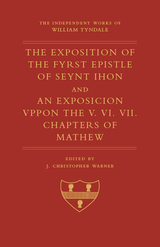
The Exposition of 1 John and An Exposition upon Matthew V-VII
William Tyndale
Catholic University of America Press, 2023
The Exposition of 1 John and An Exposition upon Matthew V-VII are William Tyndale’s two major exegetical writings, published respectively in 1531 and 1533 in Antwerp. By this period Tyndale’s English translations of the New Testament and Pentateuch had both been printed, and he was preparing a revised version of the former to be published in 1534. Among the books he produced in the interim are these verse-by-verse commentaries on St. John’s first epistle and on Jesus’s Sermon on the Mount. In them Tyndale characteristically alternates between fierce polemics and solemn homilies that together, as has been claimed, amount to the most complete articulation of his theological positions. This volume replaces the nineteenth-century editions on which scholars and students have long relied by providing an original-spelling text of each Exposition with notes recording substantive textual variants in all sixteenth-century editions; an introduction and extensive commentary documenting, in particular, parallels and differences between the two texts and Tyndale’s other works, the works of Luther and other reform theologians, and the works of the Church Fathers and others; plus a comprehensive glossary, appendices, and indices.
[more]
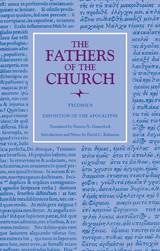
Exposition of the Apocalypse
Tyconius Tyconius of Carthage
Catholic University of America Press, 2017
The Exposition of the Apocalypse by Tyconius of Carthage (fl. 380) was pivotal in the history of interpretation of the Book of Revelation. While expositors of the second and third centuries viewed the Apocalypse of John, or Book of Revelation, as mainly about the time of Antichrist and the end of the world, in the late fourth century Tyconius interpreted John’s visions as figurative of the struggles facing the Church throughout the entire period between the Incarnation and the Second Coming of Christ. Tyconius’s “ecclesiastical” reading of the Apocalypse was highly regarded by early medieval commentators like Caesarius of Arles, Primasius of Hadrumetum, Bede, and Beatus of Liebana, who often quoted from Tyconius’s Exposition in their own Apocalypse commentaries. Unfortunately no complete manuscript of the Exposition by Tyconius has survived. A number of recent scholars, however, believed that a large portion of his Exposition could be reconstructed from citations of it in the aforementioned early medieval writers; and this task was undertaken by Monsignor Roger Gryson. Gryson’s edition, a reconstruction of the Expositio Apocalypseos of Tyconius, was published in 2011 in Corpus Christianorum Series Latina. The present translation of that reconstructed text, with introduction and notes, exhibits Tyconius’s unique non-apocalyptic approach to the Book of Revelation. It also shows that throughout the Exposition Tyconius made use of interpretive rules that he had laid out in an earlier work on hermeneutics, the Book of Rules, strongly suggesting that Tyconius wrote his Exposition as a companion to his Book of Rules. Thus, the Exposition served as an exemplar of how those rules would apply to interpretation of even the most intriguing of biblical texts, the Apocalypse.
[more]
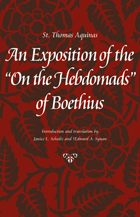
An Exposition of the On the Hebdomads of Boethius (Thomas Aquinas in Translation)
Saint Thomas Aquinas
Catholic University of America Press, 2001
The English translation itself, in facing-page format with the 1992 Leonine critical edition of Aquinas's Latin text, remains faithful to the text and at the same time clear and readable.
[more]
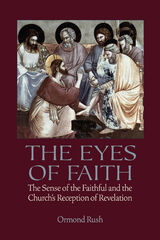
The Eyes of Faith
The Sense of the Faithful and the Church's Reception of Revelation
Ormond Rush
Catholic University of America Press, 2009
The Eyes of Faith presents a systematic theology of the sense of the faithful (sensus fidelium) and shows the fundamental and necessary interrelationship between sensus fidelium, tradition, Scripture, theology, and the magisterium.
[more]
READERS
Browse our collection.
PUBLISHERS
See BiblioVault's publisher services.
STUDENT SERVICES
Files for college accessibility offices.
UChicago Accessibility Resources
home | accessibility | search | about | contact us
BiblioVault ® 2001 - 2024
The University of Chicago Press









